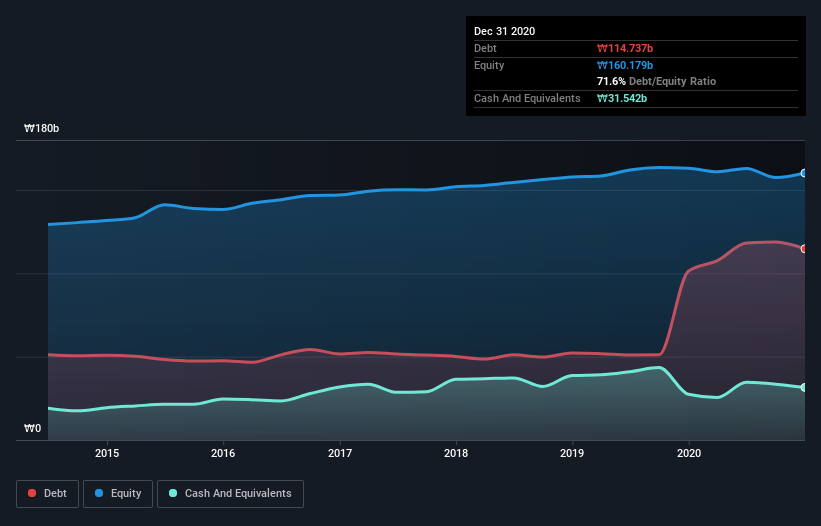David Iben put it well when he said, 'Volatility is not a risk we care about. What we care about is avoiding the permanent loss of capital.' When we think about how risky a company is, we always like to look at its use of debt, since debt overload can lead to ruin. We can see that Kumbi Corporation (KRX:008870) does use debt in its business. But the real question is whether this debt is making the company risky.
What Risk Does Debt Bring?
Debt is a tool to help businesses grow, but if a business is incapable of paying off its lenders, then it exists at their mercy. If things get really bad, the lenders can take control of the business. However, a more common (but still painful) scenario is that it has to raise new equity capital at a low price, thus permanently diluting shareholders. By replacing dilution, though, debt can be an extremely good tool for businesses that need capital to invest in growth at high rates of return. When we think about a company's use of debt, we first look at cash and debt together.
Check out our latest analysis for Kumbi
What Is Kumbi's Debt?
You can click the graphic below for the historical numbers, but it shows that as of December 2020 Kumbi had ₩114.7b of debt, an increase on ₩101.3b, over one year. On the flip side, it has ₩31.5b in cash leading to net debt of about ₩83.2b.

A Look At Kumbi's Liabilities
Zooming in on the latest balance sheet data, we can see that Kumbi had liabilities of ₩77.4b due within 12 months and liabilities of ₩95.5b due beyond that. Offsetting this, it had ₩31.5b in cash and ₩35.7b in receivables that were due within 12 months. So it has liabilities totalling ₩105.6b more than its cash and near-term receivables, combined.
This deficit casts a shadow over the ₩59.5b company, like a colossus towering over mere mortals. So we'd watch its balance sheet closely, without a doubt. After all, Kumbi would likely require a major re-capitalisation if it had to pay its creditors today.
We use two main ratios to inform us about debt levels relative to earnings. The first is net debt divided by earnings before interest, tax, depreciation, and amortization (EBITDA), while the second is how many times its earnings before interest and tax (EBIT) covers its interest expense (or its interest cover, for short). Thus we consider debt relative to earnings both with and without depreciation and amortization expenses.
Kumbi has a debt to EBITDA ratio of 3.6 and its EBIT covered its interest expense 6.0 times. This suggests that while the debt levels are significant, we'd stop short of calling them problematic. Sadly, Kumbi's EBIT actually dropped 7.0% in the last year. If earnings continue on that decline then managing that debt will be difficult like delivering hot soup on a unicycle. The balance sheet is clearly the area to focus on when you are analysing debt. But it is Kumbi's earnings that will influence how the balance sheet holds up in the future. So when considering debt, it's definitely worth looking at the earnings trend. Click here for an interactive snapshot.
Finally, while the tax-man may adore accounting profits, lenders only accept cold hard cash. So we always check how much of that EBIT is translated into free cash flow. Looking at the most recent three years, Kumbi recorded free cash flow of 34% of its EBIT, which is weaker than we'd expect. That weak cash conversion makes it more difficult to handle indebtedness.
Our View
Mulling over Kumbi's attempt at staying on top of its total liabilities, we're certainly not enthusiastic. Having said that, its ability to cover its interest expense with its EBIT isn't such a worry. Overall, it seems to us that Kumbi's balance sheet is really quite a risk to the business. So we're almost as wary of this stock as a hungry kitten is about falling into its owner's fish pond: once bitten, twice shy, as they say. The balance sheet is clearly the area to focus on when you are analysing debt. But ultimately, every company can contain risks that exist outside of the balance sheet. Be aware that Kumbi is showing 4 warning signs in our investment analysis , and 2 of those make us uncomfortable...
If you're interested in investing in businesses that can grow profits without the burden of debt, then check out this free list of growing businesses that have net cash on the balance sheet.
When trading Kumbi or any other investment, use the platform considered by many to be the Professional's Gateway to the Worlds Market, Interactive Brokers. You get the lowest-cost* trading on stocks, options, futures, forex, bonds and funds worldwide from a single integrated account. Promoted
Valuation is complex, but we're here to simplify it.
Discover if Kumbi might be undervalued or overvalued with our detailed analysis, featuring fair value estimates, potential risks, dividends, insider trades, and its financial condition.
Access Free AnalysisThis article by Simply Wall St is general in nature. It does not constitute a recommendation to buy or sell any stock, and does not take account of your objectives, or your financial situation. We aim to bring you long-term focused analysis driven by fundamental data. Note that our analysis may not factor in the latest price-sensitive company announcements or qualitative material. Simply Wall St has no position in any stocks mentioned.
*Interactive Brokers Rated Lowest Cost Broker by StockBrokers.com Annual Online Review 2020
Have feedback on this article? Concerned about the content? Get in touch with us directly. Alternatively, email editorial-team (at) simplywallst.com.
About KOSE:A008870
Kumbi
Manufactures and sells glass bottles, bottle caps, cosmetics, and plastic products in South Korea.
Acceptable track record second-rate dividend payer.
Market Insights
Community Narratives



